Product management tools are designed to meet all the product-related tasks like prototyping, defining a product roadmap, user journey mapping, customer research, product road mapping, feature prioritization, analyzing product data, and managing product releases. They are a set of software designed to help product teams to plan a product and track and manage the products to achieve the defined goals within time. It also helps team members to collect new ideas and lay out specific plans to turn ideas into a finished product.
But a product manager’s job involves a lot more than just the product insight, tracking backlog, and reviewing the product roadmap. Whether you’re a new product manager or a seasoned PM you don’t want to miss out on the key component of your role because you’re lacking the proper tool.
Let’s look at some of the best tools for product managers below.
Top Product Management Tools & Software:
1. ProofHub: Best for Project Management and Team collaboration
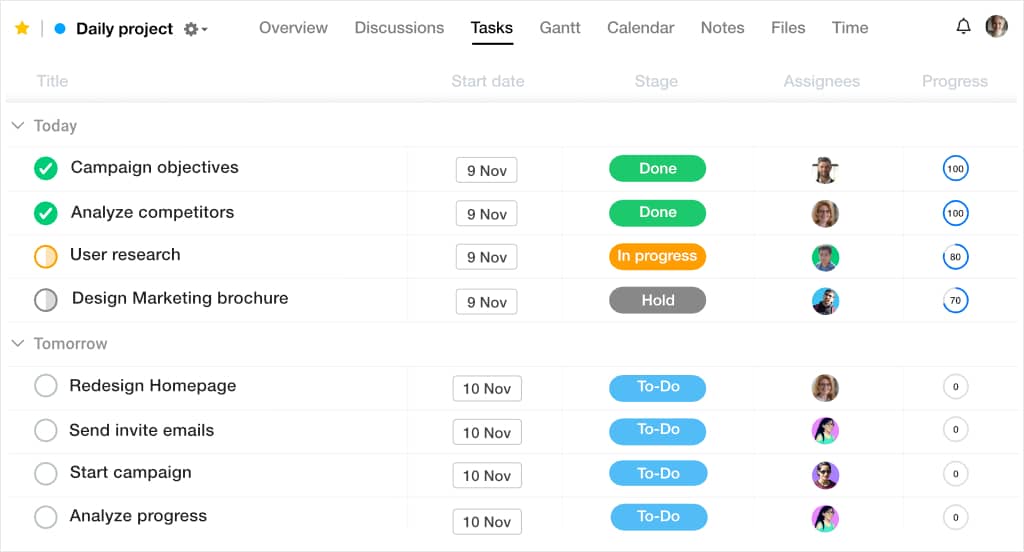
From creating and managing workflows to prioritizing product goals, and creating product roadmaps to advanced resource management, ProofHub does it all. It is the perfect candidate for all your product management needs, as it offers features like project management, team collaboration, easy communication, file integration, time tracking, and many more. You would also find how Gantt charts are helping managers with project planning and road mapping in more than one way.
Further, an innovative addition to the various product management views is through Kanban boards. Its drag-and-drop features allow the team to implement a time-effective approach to performing tasks and is a great way to divide tasks into workflows and break them down for better understanding. Additionally, its online proofing tool is a boon for product teams as it helps managers and clients review, proof, and explicate files with markup tools. With ProofHub, teams can centralize product vision, break down silos, engage in a robust exchange of ideas, work across cross-functional teams, and successfully create a product roadmap.
Pricing: The standard plan starts at a Flat $45/month (billed annually), and the Ultimate Control plan is at $89/month (billed annually).
2. ProductPlan: Best for Product Roadmapping
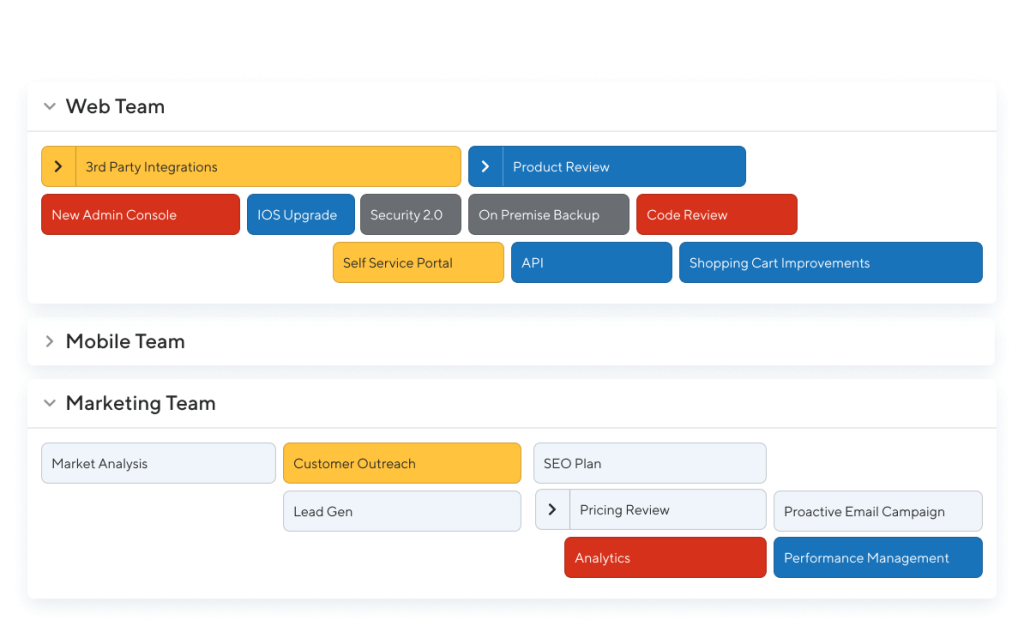
It is an easy-to-use product management software designed to help teams better plan, visualize and share the product strategy. It is a roadmapping and collaboration tool in one, designed to “align your team so you can build what matters.” With this tool you can create and share unlimited roadmaps, pivoting between the timeline, list, and table views as you please. Its drag-and-drop editor makes it easy to build and customize as you go.
Additionally it also features a “comments and mentions” function, that allows you to tag your teammates, post status updates, and queries directly in the platform. Overall, it is a great all-rounder for all the product managers.
Pricing: Business plan starts at $39/month per editor and the Enterprise Plan at $69/month per editor.
3. ProPad: Best for Product lifecycle management tools
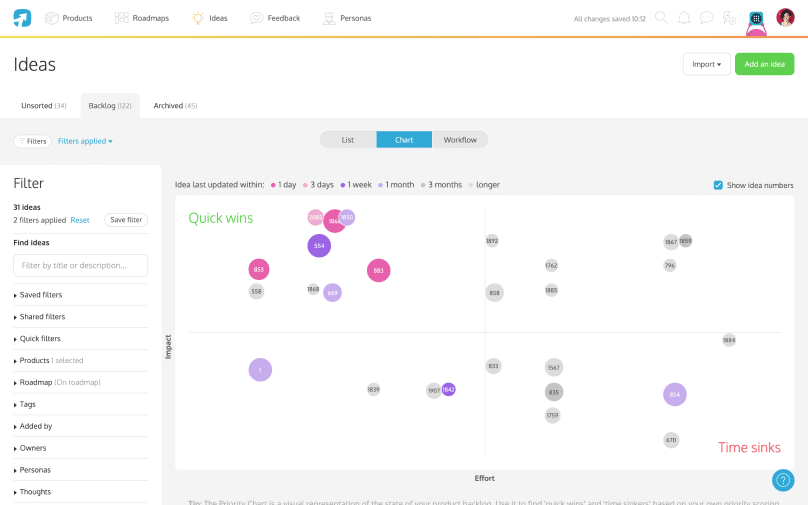
It is a flexible product management software for product managers and teams to share ideas, collect feedback from users, create visual product roadmaps, and prioritize product development actions effectively. It claims to be the #1 product management platform. And, considering the vast array of features this might be true. What makes it great?
It is its powerful modules and prototyping tools and sorting through customer feedback. The 3 key pillars to the ProPad platform: Lean roadmapping, idea discovery and management, and customer feedback management. That’s what makes this tool great. It is an excellent alternative for its user interface that presents us with the latest updates of the team’s work with an attractive design to show you where you are, why, and where you get to.
Pricing: Essential plan for $20/user per month and Pro plan for $60/user per month.
4. Google Sheets Best for Spreadsheets and work with other people

It offers multiple features for project management, like basic templates for a project timeline, plans, trackers, and Gantt charts to track your project start date, task duration, and end date. It also gets along with other google project management tools like Slides, Docs, and Gmail. Undoubtedly it is one of the best tools to store data, track performance metrics, and create dashboards and reports.
With a well-organized spreadsheet, product managers can quickly analyze robust data sets and make informed decisions about their efforts. There is also voice typing for easier thought processing, and if you do not have internet access, you can enable Offline Mode.
Real-time data syncing makes spreadsheet software ideal for project coordination and team-based tasks; in fact, it is so powerful that you can take collaboration to another level. It enables you to build a tailor-made system.
Pricing: No cost
5. Pendo: Best for behavior analytics and user onboarding
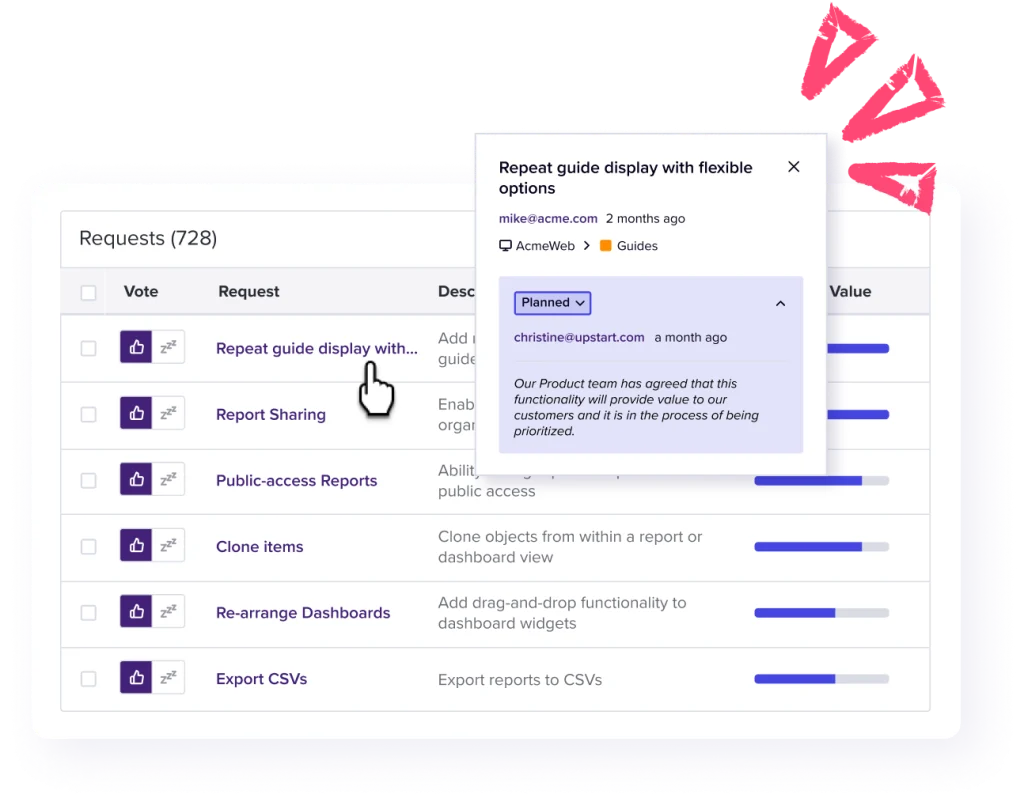
It is a product-analytics app to help software companies develop products that resonate with customers. This app allows software makers to embed in their products that can lead both to a better product experience for users and new insights for the product team. According to the research by IDG, the majority of organizations (91%) have adopted or have plans to adopt a digital-first business strategy.
While surveys and research gives you insight into what your users think, a tool like Pendo gives you access to data about how users can actually interact with your product. It allows you to create custom in-app guides to optimize user onboarding for your product, and to capture and prioritize feature requests from your users through the feedback tool. It is a great addition to your stack if you want to implement a highly data-driven, user-centric approach to product management.
Pricing: It offers three separate pricing plans for each arm: Engage, Feedback, and Adopt. There’s a free plan available for the Engage suite. For clear pricing, you’ll need to get in touch with them for a quote.
6. FullStory: Best for digital intelligence system
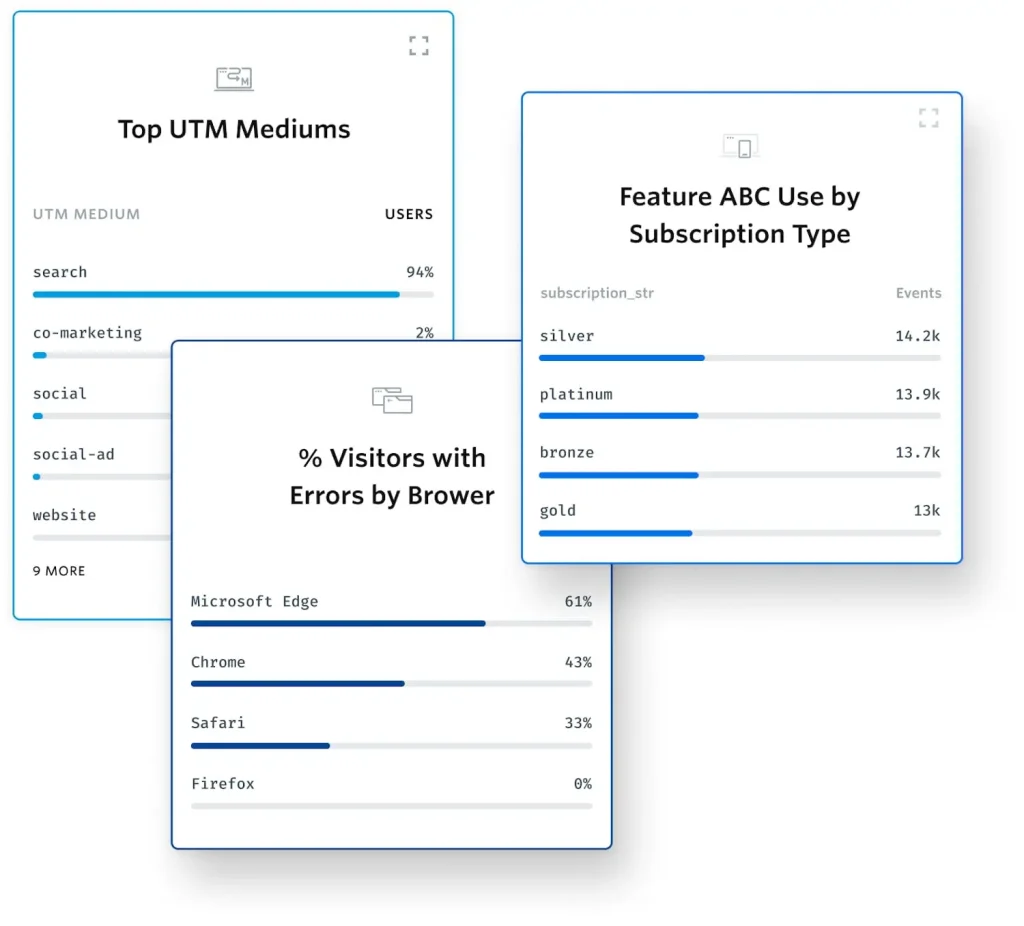
It is a web-based digital intelligence system that helps optimize the client experience that combines rich product analytics, robust session detail, and collaboration tools. Product teams use this tool to improve their product experience for the user and in turn, to boost customer retention, increase profits, and improve operational efficiency.
With complete and secure data capture, comprehensive product analytics, and advanced session replay functionality and make improvements accordingly. It is endorsed by the likes of Peloton, Forbes and with an open API and a growing catalog of interactions, it connects seamlessly with your product management tools for a comprehensive data picture.
Pricing: It has a 14-day free trial and offers two price plans: Enterprise and Business, with prices available on request.
7. Miro: Best for brainstorming and ideation
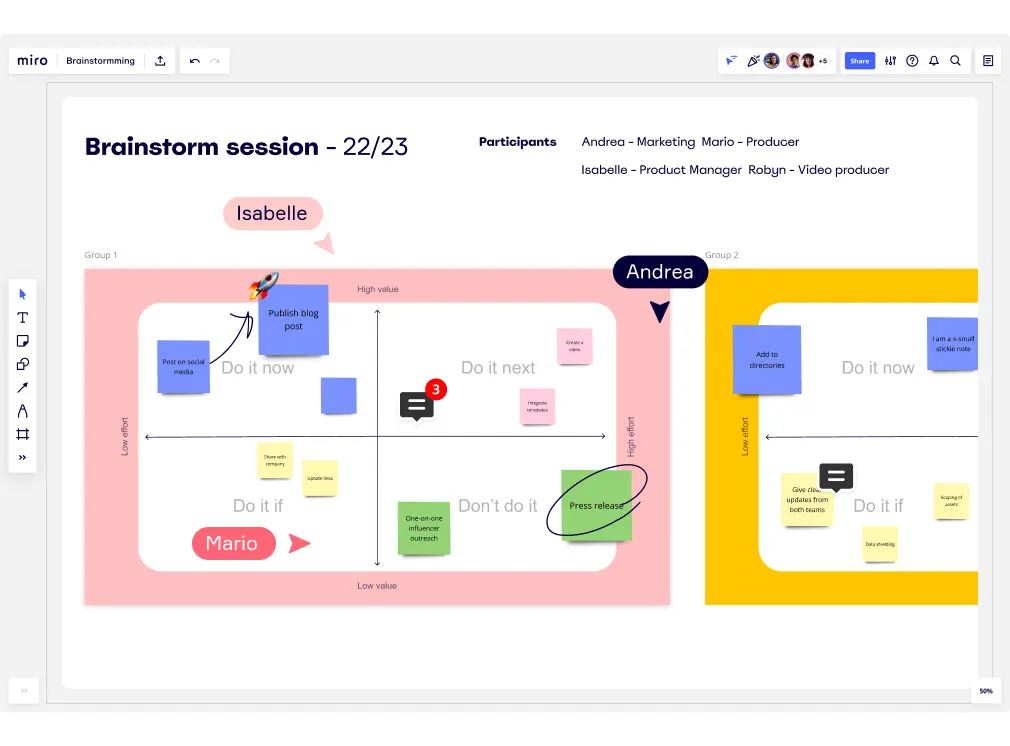
It has many built-in frameworks that help product managers, and their teammates organize thoughts. It creates a hub for cross-functional work that works with all other tools. It standardizes and scales processes company-wide, whether your team is co-located or distributed worldwide. Additionally, its app integrations and connections can connect to other virtual tools such as Google Drive, Slack, Asana, Trello, and SurveyMonkey.
Miro helps your team go beyond brainstorming with a wide variety of features: workshopping, strategy mapping, agile ceremonies, product development, and process visualization. It can perform company-wide tasks as well as serve specific department purposes. It is best for live product syncs in any distributed team. At the same time, it has a growing library of add-ons for collaboration, visualization and planning.
Pricing: The pricing starts from $8 per member/month to $16 per member/month
8. Craft.io: Best product feature prioritization engine
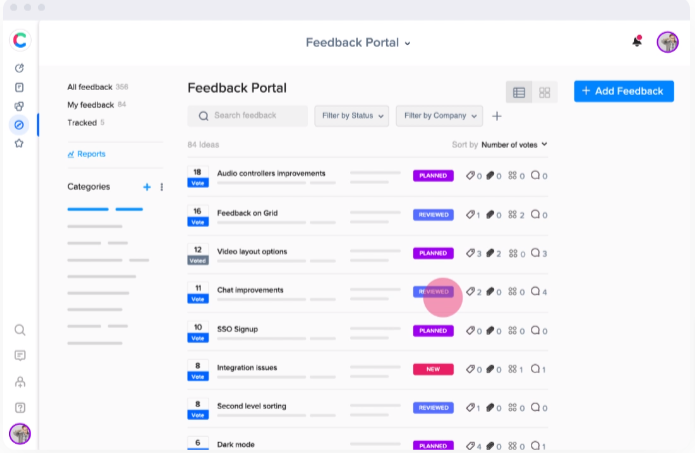
Seamless management platforms like craft.io offer intuitive road-mapping capabilities through interfaces designed to communicate your product’s specifications and strategy. With craft, you can create a clear product strategy for effective management and customize each team’s workflow to define your process. This platform allows you to easily monitor your project’s progress and track the status of each task, document product strategy, and connect it to execution.
It understands your customer needs and establishes clear product processes. It helps build transparency and alignment across your organization, leading to better products and smarter teams. You can link all strategic elements directly to product deliverables and use data insights to accurately contextualize and guide all product decisions. It easily integrates with the most popular development and user feedback tools.
It eases the pain of digital transformation by making it easy to adopt a product mindset. By using craft.io, you can simplify prioritization, rally stakeholders around your roadmaps, collaborate effectively with developers and keep the customer at the heart of your product work. From roadmapping to prioritization, through idea-collection, set your team on the right course by craft.io.
Pricing: Essential $39 user/month annually. Unlimited Pro at $89.00 per month
9. Dragonboat: Best for connecting product development to OKRs
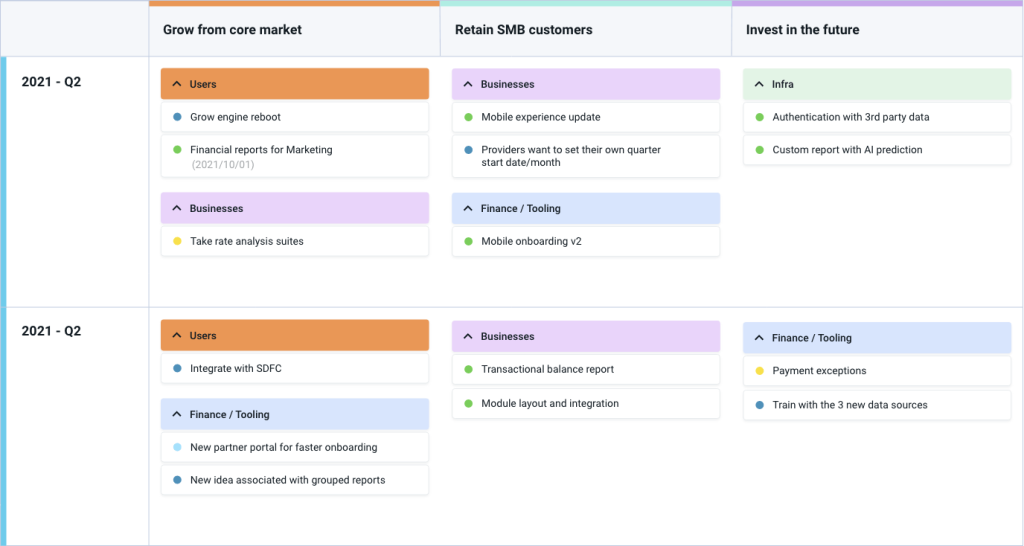
Dragonboat is the fastest-growing product management platform for product leaders to strategize, prioritize, deliver and improve industry-leading products. With Dragonboat, you can connect objectives with initiatives, create data-driven roadmaps, integrate with engineering tools, and adjust allocation based on outcomes. It is an all-in-one product portfolio management platform connecting OKRs, customer needs, product strategies, and resources with Agile execution.
Dragonboat can centralize feedback and requests, automate progress tracking and alerts, and make stakeholder communication possible effortlessly. Make real-time visibility on allocation, align products with strategic factors, and prioritize qualitatively or quantitatively.
Pricing: $49 – $99 per editor/month with unlimited free read-only users.
10. Productboard: Best for product development with customer reach
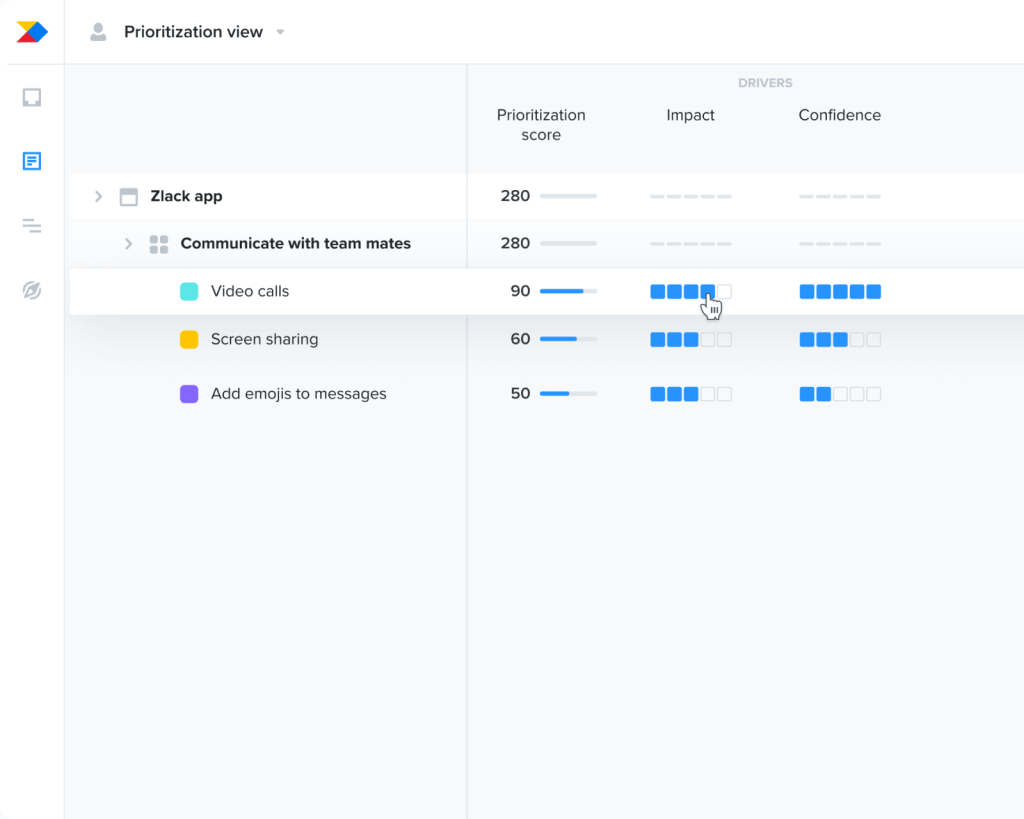
Productboard is the leading customer-centric product management platform to empower teams to get the right products to market faster. It is a complete solution for product teams to understand user needs, prioritize what to build next, align everyone on the roadmap, and engage with their customers. It helps product teams understand what costumes need, prioritize what to build next, and align the team members on the roadmap.
Additionally, you can integrate with popular customer touchpoints like intercom and zendesk, and hundreds of others via Zapier. It is responsible for the product across the product life cycle. Its core responsibilities include:
- Defining a product vision.
- Setting the product strategy.
- Executing it by delivering new functionality that meets customer needs and supports business goals.
Pricing: Essential plan costs @25 per month, and the Pro plan costs $70 per month
Criteria for Selecting Product Management Tools
User Interface (UI)
You will have to go through questions like: Does the app have a clean, intuitive, and modern-looking user interface across different operating systems? Does it offer adequate customer support across different mediums? And, How steep is the software’s learning curve? Through these questions, you will get actionable results for selecting the best product management tool.
Understand your product management needs:
To evaluate the needs of your product management team by creating a charter with a series of questions for a new product management tool. The questions can be used as a reference point for evaluating products and may include questions such as:
- What are the main goals of your product?
- What features are essential for the product?
- How does the product impact the strategy and objectives?
- What is your budget for the project and what kind of data do you want to have in the future?
- How do you plan on managing customer feedback?
Define Product Strategy
Did you know, 70% of businesses refer to the product strategy whenever they have to make major decisions? Without a clear strategy, it will be difficult to identify your company’s goals, product features, and objectives. You can start by identifying your company’s main goals, product features, and objectives. You can differentiate the company from the competitors, generating revenue or increasing or decreasing the customer base. Next, you could list or write down a product to do with product design, lead generation, or monitoring of up-to-date data on marketing campaigns.
Define Requirements
Once you better understand the team’s needs and your product strategy, it is important to define specific requirements for the product management tool. Your requirements will differ depending on the product management software, and there are three main types of product management tools:
- Different tools to focus on analysis
- Project management tools and product management software to help product delivery
- Tools to focus on collaboration for software development, task management, customer feedback, etc.
Analytical Tools: You’ll need a product tool like ProofHub that offers unique metrics and insights on how users interact with your product.
Collaboration Tools: Your team will also need a tool that offers easy collaboration features to manage customer feedback easily and feedback from stakeholders and other team members.
Research Projects: Now that you have a better understanding of needs and requirements, it’s time for some research on the different product options available. The best way to do this is by reading product reviews and analyzing product demos; this will give you a better understanding of how each product works and the features it offers.
Evaluate Products based on Requirements
After you’ve done the research, it is time to evaluate products that are based on specific requirements. You can start by ranking each product based on your specific requirements. This step will help you compare different options and determine the complete product management suite for your team.
Keep in mind the Budget.
Budget is always an important factor when looking at product management tools, but it’s even more important if you are a startup or a smaller business. Keep in mind that the best way to set a budget is putting your tool into practice when evaluating different options. You can also ask your team, friends, and other colleagues for suggestions on product management tools.
Final Words
The most precious tools are only those that give complete freedom to product managers and organizations to properly function their tasks. It is always good to have tools that come with a complete package and leave no stone unturned when it comes to product management; the tools mentioned above are excellent examples of it.




















No Comments